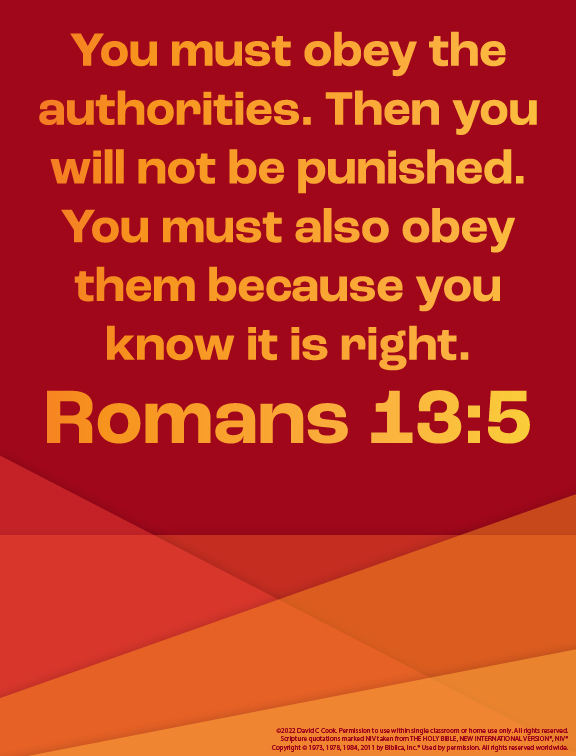During the lesson, the information for you to know is written in regular type, and what we suggest speaking or reading aloud to children is in bold. All resources for this lesson, including the Teacher Guide, Student Page, Family Connection Card, and other resources can be downloaded in a ZIP file by clicking on the following link:
In some lessons you will find "resource articles." These are articles written by experts from around the world to help equip you for your work with children and adolescents. Share them with parents or guardians if you consider it appropriate.
Honor your father and mother. Then you will live a long time in the land the Lord your God is giving you.
Exodus 20:12
When we believe in God, we want to do what is right. God gave this commandment to His people on Mount Sinai after the people had begun to stumble and fall. They were not living the way God wanted them to. God asked them to honour their parents, just as we are called today to honour ours. God gave us to our parents so that they could guide, protect, teach, and discipline us. God knows that no one on earth is perfect, and this includes parents.
Think about the people who raised you. Spend some time thinking about your relationship with them. How did you show honour to them? How might you have honoured them in other ways? How does your relationship with those who raised you affect how you show honour to others? You are never too old to show honour to those who raised you.
Encourage families to talk to their children about the ways honouring caregivers can help children. Discuss how caregivers protect, guide, teach, and discipline children. How does a good attitude and obedience make life in the home better?
Teacher Tip: If possible, email or text the Family Connection Card to the families of your students.
Greet the children as they come to class. Ask each child to tell you 1 fact about a person who takes care of him (a parent, grandparent, or other caregiver).
Let’s start our time today with a fun game about obedience!
Use this game to teach that obedience involves listening carefully. Have children stand in front of you. Tell them they should do the actions you call out but only if you first say, “Mother says” or “Father says.” If you do not say one of these phrases before an action, the children should not do what you say. Call out instructions to do things, such as:
Be sure to say, “Mother says,” or “Father says” before some of the more difficult tasks, such as pushing up with your arms.
Allow 2–3 students to answer the following questions.
Obedience is not always fun. Sometimes when you obey you do not do what you wanted to do. Or you may need to do something you do not enjoy.
Today we are going to talk about obeying the people who take care of you. This could be a mom, a dad, a grandparent, an aunt or uncle, or any other person who cares for you or provides for your daily needs.
There are many reasons we obey our parents and caregivers. The most important reason is that God tells us in the Bible we should honour and obey the people who raise us.
Read this verse directly from your Bible.
Honor your father and mother. Then you will live a long time in the land the Lord your God is giving you.
Exodus 20:12
Allow 1–2 students to answer each question.
In Moses’ time, God had promised to deliver the Israelites to the land He had promised Abraham. Honouring what God wanted, including this commandment, would bring good things to the people.
God tells us to honour and obey our parents. He has placed them in our lives for our good. Those who care for you are placed by God to guide, protect, teach, and discipline you. Most caregivers want you to grow up to be healthy adults.
Optional: If you are using The Action Bible, allow the children to read the story of Jesus as a boy in the temple on pages 576–578. After a couple of minutes, continue with the lesson.
Optional: If possible, show the image from The Action Bible.

The Bible gives us an example of obeying our parents in the story of Jesus as a boy. Jesus, God’s perfect Son, obeyed His parents. Each year His family travelled from their town to the city of Jerusalem for a special feast. This journey took them several days. Families travelled in large groups together with other families. When Jesus was 12 years old, they went to the feast as usual. Let’s pretend we are taking a long walk.
Have the children stand. Walk in place together and pretend to get tired from walking.
Only 2 more days until we get to Jerusalem! I cannot wait for the feast!
Have students sit as you continue the story.
When the feast was over, Mary and Joseph left with a very big group of people to return home. But after a day of travel, Mary and Joseph realized Jesus was not with their group! They did not know where He was! So, they turned around and went back to find Jesus.
How do you think Jesus’ earthly parents felt when they realized He was missing?
Allow 2–3 children to respond.
Listen to what the Bible says about what happened when Mary and Joseph found Jesus.
Read the following verses from your Bible.
After three days they found him in the temple courtyard. He was sitting with the teachers. He was listening to them and asking them questions. When his parents saw him, they were amazed. His mother said to him, “Son, why have you treated us like this? Your father and I have been worried about you. We have been looking for you everywhere.”
Luke 2:46, 48
Mary and Joseph were worried about Jesus because they did not know where He was for 3 days! If Jesus had been an ordinary boy, this story may sound as though He was not obeying His parents. But, remember Jesus was a perfect boy because He is God’s Son. Listen to Jesus’ response to His mother’s concern.
“Why were you looking for me?” he asked. “Didn’t you know I had to be in my Father’s house?” But they did not understand what he meant by that.
Luke 2:49–50
Who is the Father Jesus is talking about in these verses?
He is talking about His Father, God.
As God’s Son, Jesus wanted to obey and please His heavenly Father. However, just like all sons and daughters, God wanted Jesus to also obey His earthly parents. Listen to what happened when Jesus went home with His parents.
Then he went back to Nazareth with them, and he obeyed them. But his mother kept all these things like a secret treasure in her heart.
Luke 2:51
Jesus understood that His heavenly Father, God, had put Mary and Joseph as His caregivers. He needed to honour and obey God, but He also needed to obey His parents.
Here are some ways you can obey your caregivers:
God designed parents and caregivers to have a special position of honour. They guide, protect, teach, and discipline us. God uses them in our lives to help us learn to honour Him and others. As we honour and obey our caregivers and parents, we honour God. We also learn to respect all those in authority, including God, rulers, and other leaders.
Now let’s hear some stories. If the child is showing honour and obedience, stand up. If he is not showing honour or obedience, stay seated.
If you would like to share your own example of a time you showed obedience to a caregiver, stand up.
Allow 2–3 children to give examples of obedience in their own lives.
Optional: If you are using Student Pages, give the children crayons. Allow about 2 minutes for them to draw themselves with their caregivers.

Parents and caregivers are some of the people in our lives who deserve honour. We honour them by speaking to them with respect, listening to what they ask, and obeying them. This is not always easy to do, but God can help you. Our memory verse reminds us we should obey leaders and others in authority, including our caregivers.
Read the verse aloud from your Bible.
You must obey the authorities. Then you will not be punished. You must also obey them because you know it is right.
Romans 13:5

Repeat the verse in the same way as last time. Divide children into 2 groups. Say the first sentence of the verse together. Then have 1 group ask the question and the other group answer it.
All: You must obey the authorities.
Say the verse together 3–4 times. End class by saying this blessing, based on Exodus 20:12 and Ephesians 6:1, over the children.
Blessing: May you honour your mother, father, or caregiver today with your attitude, words and actions. May you do what is right by obeying your parents.
Lead the children in singing this quarter’s song, if possible.
Life on Life ©2020 David C Cook. Reproducible for home or classroom use only. All other uses require written permission from David C Cook [email protected]. All rights reserved.